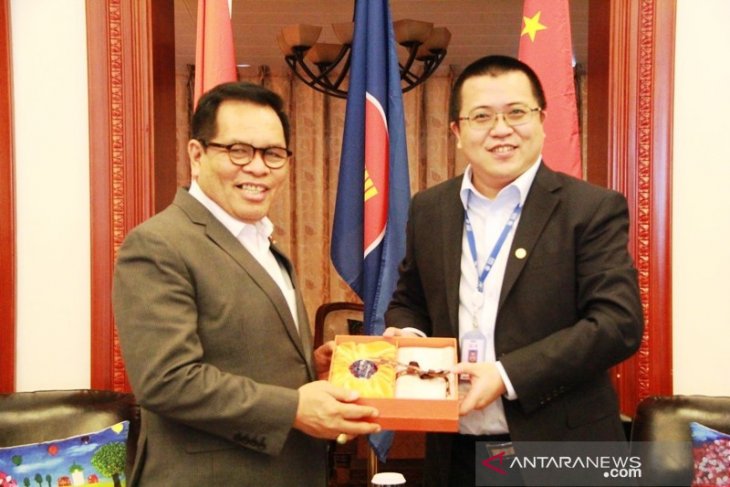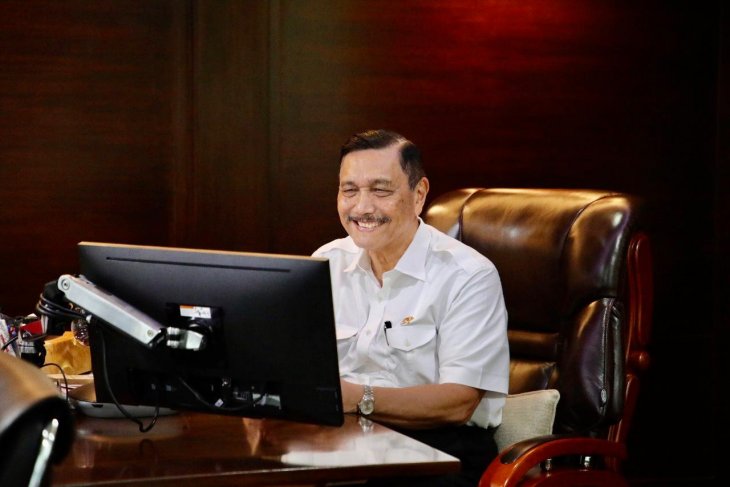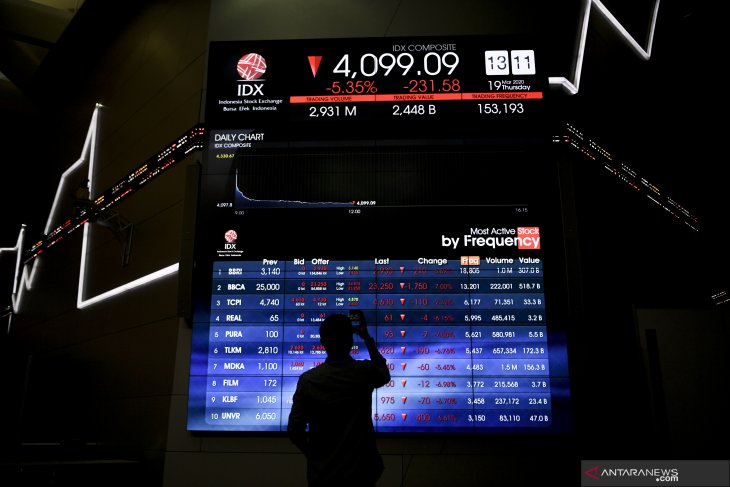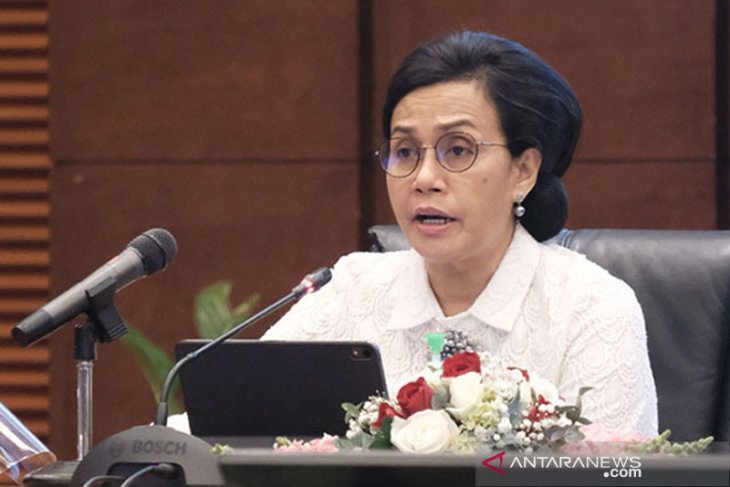Live Streaming
Program Highlight
Company Profile
August
Indonesia, China Train Sights on Economic Diplomacy in TTI Sectors
Written by Ani Hasanah
Indonesian Ambassador to China Djauhari Oratmangun (right) and Vice President of China Gezhouba Group Internasional Engineering Co Ltd, Hu Peng, in Beijing in May 2020
Indonesia's relations with China are concentrated largely on economic diplomacy in the trade, tourism, and investment (TTI) sectors by capitalizing on the plethora of existing opportunities.
Trade and investment partnership between Indonesia and China recovered amid the ongoing global COVID-19 pandemic. Merely the tourism sector had yet to show signs of recovery.
"Hence, we are working with the Ministry of Tourism and Creative Economy and the Bali Tourism Board to continue to promote Indonesian tourism, including by preparing digital promotional materials for 'Work from Bali' and readying tourist destinations, albeit with stringent health protocols in place," Indonesian Ambassador to China Djauhari Oratmangun told ANTARA on Wednesday.
Oratmangun noted that in the first semester of 2020, merely 202,204 Chinese tourist arrivals to Indonesia were recorded through various entry points, or a decrease by 80.74 percent, from the corresponding period in 2019.
In the last two months, China’s tourism sector has begun to grow, likewise with MICE activities, including exhibitions that had started to be organized. Among the last major events was an international auto show held in Wuhan in which thousands of people visited daily, with stringent health protocols being applied.
"Changes in the people's way of living in this pandemic situation actually open up new opportunities for the Indonesia-China cooperation," the ambassador noted.
The Indonesian Embassy in Beijing has also held several economic diplomacy activities in the TTI sectors by utilizing digital platforms and influencers.
"This is part of our efforts to support the task of the Team for the Acceleration of Economic Recovery (TPPE) formed by our Ministry of Foreign Affairs," he stated.
The Indonesian Embassy in Beijing also encouraged increased cooperation in the areas of digital economy and value-added industries, particularly in the health sector and electric vehicles.
Indonesia has also pioneered and established e-commerce, financial technology, and digital infrastructure partnerships with leading companies in China, including ByteDance, Meituan Inc, Alibaba Ant Financial, Jumore, JD.com, Baidu Inc, and Tencent Holdings Ltd.
"Currently, Indonesia has five unicorns and one decacorn, some of which have established cooperation with Chinese companies," the ambassador noted.
In the meantime, in the first half of 2020, the total trade between the two countries was valued at US$35.6 billion (Rp527 trillion).
Some of Indonesia's leading products -- coal, iron and steel, swallow's nest, frozen fish, tropical fruit, packaged fruit, canned fish, footwear, household utensils, processed wood, and electronics -- had recorded a notable rise in the value of exports to China.
China remains the second-largest investor in Indonesia after Singapore, with a value of US$2.4 billion (Rp35.5 trillion), an increase of nine percent from the corresponding period in the previous year. (ANTARA)
August
Indonesia Needs Train-based Mass Transportation Development
Written by Ani Hasanah
Coordinating Minister for Maritime Affairs and Investment Luhut Binsar Pandjaitan ANTARA/HO Kemenko Kemaritiman dan Investasi
Coordinating Minister for Maritime Affairs and Investment Luhut Binsar Pandjaitan believes Indonesia might be able to save nearly Rp100 trillion annually by developing a train-based mass transportation system.
Of the figure, Rp40 trillion will be saved from the operating costs of motor vehicles and Rp60 trillion from the travel time, Pandjaitan stated during a webinar on Land Transportation to Knit Indonesia's Diversity in Jakarta on Wednesday.
"The value is equivalent to four percent of the regional gross domestic product (PDRB) of Jabodetabek (the Greater Jakarta areas covering Jakarta, Bogor, Depok, Tangerang, and Bekasi)," he stated.
The minister believes that the use of the mass transportation means will also result in a significant reduction in traffic congestion.
According to commuter line operator PT KAI Commuterline Indonesia (PT KCI), the number of commuter line passengers in Greater Jakarta had reached 336 million last year.
Land transportation has been instrumental in contributing considerably to the national economy. The Indonesian government is strongly committed to developing land transportation infrastructures, not only in Java but also in the rest of the country, he stated.
The government's commitment to developing a land transportation system across Indonesia is apparent from the construction of toll roads in Sulawesi, Kalimantan, Sumatra, and Bali as well as the planned development of train lines in Kalimantan, Sulawesi, and Bali, he remarked.
Quoting the results of a study conducted by the Institute for Economic and Social Research of the Economics School of University of Indonesia (LPEM FE UI), Pandjaitan explained that every one-percent hike in the construction of roads will raise economic growth by 8.8 percent.
Hence, the government has deemed it necessary to develop road infrastructures through public and private investment under a government and business entity partnership (KPBU) scheme, he stated.
"In addition, road connectivity, including through toll roads, serves as an essential component to drive economic transformation to the manufacturing and service sectors," he remarked.
Pandjaitan further highlighted the need for the government to focus on river, lake, and ferry transportation that also play a vital role as one of the connectivity factors. (ANTARA)
August
IHSG Sees Correction as Investors Book Profits
Written by Ani Hasanah
The Jakarta Composite Share Price Index (IHSG) closed lower on Wednesday evening due to profit-taking by investors.
The composite index of the Indonesian Stock Exchange (BEI) fell 22.36 points, or 0.42 percent, to touch 5,272.81, while the index of the 45 most liquid stocks dropped 4.18 points, or 0.5 percent, to reach 834.84.
"The weak IHSG is the result of investors' profit-taking ahead of the long weekend. The benchmark interest rate, which remains unchanged, has satisfied the market expectation," Indo Premier Sekuritas analyst Mino said in Jakarta on Wednesday.
The IHSG weakened in less than one hour after opening higher in the morning. It continued to stay within the red zone until the close of trading.
On a sectoral basis, shares from eight sectors saw a correction, with the various industrial sector shares recording the deepest decline at minus 1.19 percent, followed by the basic industrial sector and the manufacturing sector at 1.1 percent and 0.93 percent, respectively.
Meanwhile, the trade sector and the mining sector increased 0.25 percent and 0.09 percent, respectively.
Based on data from BEI, the net foreign buy reached Rp325.62 billion in Wednesday's trading.
Trade frequency was recorded at 669,212 transactions, with 12.7 billion shares, worth Rp8.01 trillion, changing hands on Wednesday.
There were 162 gainers against 243 decliners, and 172 shares remained unchanged.
Among regional markets, the Nikkei index strengthened 70.52 points, or 0.31 percent, to 23,110.61; the Hang Seng index fell 188.47 points, or 0.74 percent, to 25,278.91; and, the Straits Times index tumbled 3.17 points, or 0.12 percent, to 2,559.92. (ANTARA)
August
Pandemic can Provide Momentum for Reform : Finance Minister
Written by Ani Hasanah
Finance Minister Sri Mulyani Indrawati. (ANTARA/HO-Ministry of Finance/pri/ac)
Indonesia’s Minister of Finance, Sri Mulyani Indrawati, has said the COVID-19 pandemic could provide momentum for reforms in various fields, including education, health, social security, and infrastructure.
“We want to use the moment of COVID-19 as a momentum to reform many sectors, namely education, health, and social security. We are heading for a future where Indonesians are at the core,” she said at an online discussion in Jakarta on Wednesday.
To become big, she continued, a country needs great people, which makes improving the quality of human resources (HR) a priority.
“There is no great country without great people. It (a country’s wealth) is always in the (quality of its) human resources,” she said.
She further said that the participation rate for basic education in Indonesia has now reached 100 percent, however, the next challenge is to ensure that learners reach a higher level of accomplishment.
"Can they think critically? We are still left behind. The Indonesian demographic is dominated by young people, this must be considered. The welfare of all the children of the nation's future is important," she added.
Ensuring justice for all Indonesian people must also be a priority, considering that poor families will not have access to good health and education, she pointed out.
Not only that, Sri Mulyani stated, Indonesia is also still lagging in the infrastructure sector even though currently, access to travel between cities, between islands, and between countries is considerably easy.
"We have a gap in infrastructure, especially outside Java. All islands from Sumatra to Papua," Sri Mulyani continued.
She said she believes the development of equitable infrastructure in all corners of Indonesia is an important aspect in efforts to make it an upper middle income country.
"Infrastructure is still needed to go to upper middle income and even to upper country (level),” she added.
The minister said she wishes to see all Indonesian children getting the same opportunity to access public services, with the support of good institutions at the government, state-owned enterprises, and private levels.
"What legacy do you want to see in the future? I want to see all the nation's children have the same opportunity to get access to public services," she remarked. (ANTARA)


